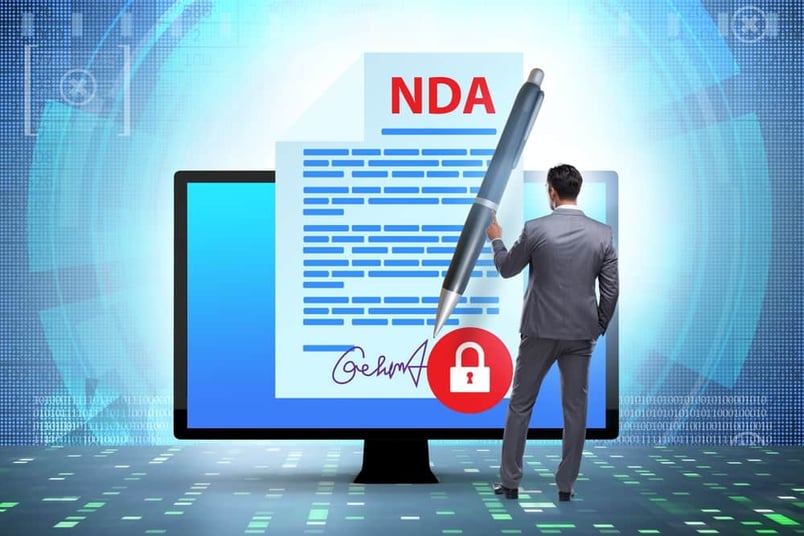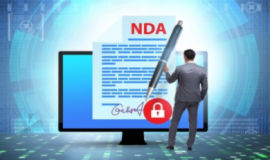Non-Disclosure Agreement (NDA) automation can be as basic as using drafting templates, clause libraries, and drag-and-drop editing tools to make manual processes easier. But more complex NDA automation can employ the latest in Artificial Intelligence (AI) to run a draft through a system that delivers lawyer-quality markup. These same systems can also intelligently create and leverage Digital Playbooks to guide the review process. Automation may involve risk analysis and contract-forwarding to appropriate parties based on the results.
So why is NDA automation a big deal? Read on to learn more about the potential implications and challenges of an AI-infused NDA review process.

Why Automate the NDA Process?
While taking steps toward contractual efficiency makes logical sense across the board, the benefits are especially palpable for legal teams dealing with non-disclosure agreements. Here’s why:
-
- NDAs are a major time sink. It typically takes a team 1-3 days to review a non-disclosure draft. For large corporations, the sheer scale of NDA reviews absorbs nearly 30% of their routine work. And that manual work is painstakingly slow. Teams spend the majority of their time simply looking up specific clauses and precedents. Exercising due diligence isn't easy when very few NDA litigation case results are available to compare to one another. But software can complete this process in five minutes and look up information for in-house lawyers instantaneously.
- NDAs are expensive. The cost to draft, review, and negotiate a single NDA ranges between $114 and $456, according to the Association of Corporate Counsel. To get their money’s worth, companies can reduce the manual labor on these contracts, speeding up deal flow and freeing top legal talent to focus on higher dollar matters.
- NDAs can lead to burnout. Axiom’s 2022 In-House Counsel Survey Report found that the volume and complexity of legal matters have increased considerably over the past few years for 99% of in-house legal counsel. Further, 41% say spending too much time on administrative tasks is a core problem that hampers productivity. Repetitive tasks, work that is not aligned with the organization’s objectives, and unnecessary administrative burdens are among the top complaints of 34% of those surveyed, describing their work as “unengaging.” As a result, 57% of in-house counsel are open to new positions where they might escape stress, poor work/life balance, and burnout. Automation could make daily tasks more efficient and free staff from menial work.
Potential NDA Automation Pitfalls
When automating NDAs, teams must understand that software is not intended to replace human judgment. When all review duties are delegated to machines, pitfalls arise, including weakened negotiating positions, unfavorable outcomes, and diminished relationships.
Rather, the technology does what it does best: redline inbound contracts in a timely fashion, compare contracts to legal playbooks, and utilize its vast knowledge base to scrutinize every detail. Fortunately, with machine learning algorithms continuing to improve, this base of data is ever-expanding and customizable.
Legal teams can avoid NDA automation pitfalls by familiarizing their systems with past NDAs for review, or by inputting custom automation rules to further streamline the automation process.
Given all that’s possible today, the biggest danger to a legal department is lagging behind and accepting inefficiency as a business norm. As JD Supra points out: “Relying on boilerplate may jeopardize your confidential information.” Courts take the definition of confidential information, exclusions, length of term, and disclosure of confidential information quite literally, so legal teams will need to take care to use consistent, clear, and unambiguous language in every single draft.
Automate Your NDA Process with LexCheck
LexCheck is helping businesses automate their NDA review processes with a customizable yet easy-to-use solution that delivers exceptional value. Its AI-powered legal contract review technology leverages machine learning and natural language processing to provide lawyer-quality review, markup, and insights that can automatically tailor third-party agreements to conform with a company’s negotiating playbook of business essential terms.
Representing the very best of legal technology, LexCheck can:
- Redline a draft for playbook compliance in 5 minutes
- Color-code sections in green (low risk), yellow (moderate risk), or red (high risk)
- Insert suggestions with contextual notes to further guide revisions and negotiations
- Create and enforce contract consistency across the board
Businesses have already seen tremendous results by incorporating LexCheck into their NDA review process. For example, when faced with anticipated 30-40% growth in non-disclosure agreements, the leading consulting firm, RSM, turned to LexCheck to handle 1,400 of its NDAs and accelerate deal flow. Thanks to LexCheck’s NDA automation capabilities, RSM decreased its review time by 50%, saving more than 800 employee hours in the process.

